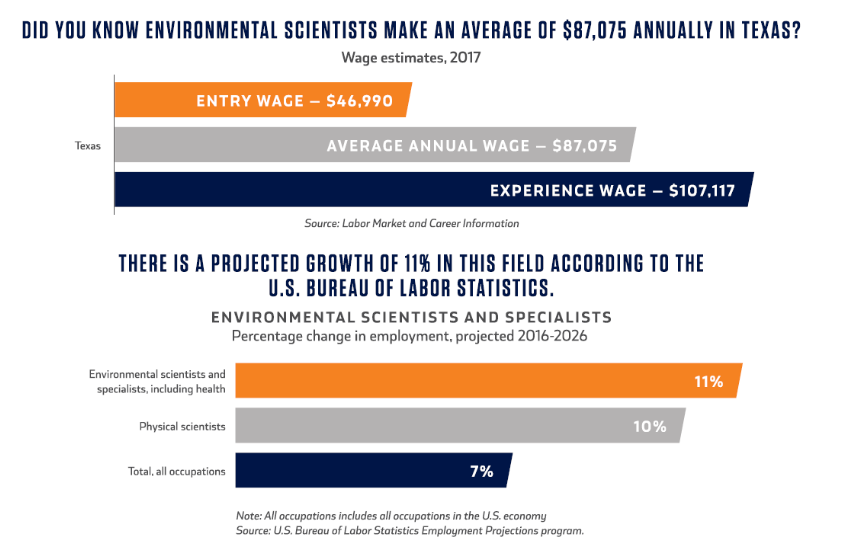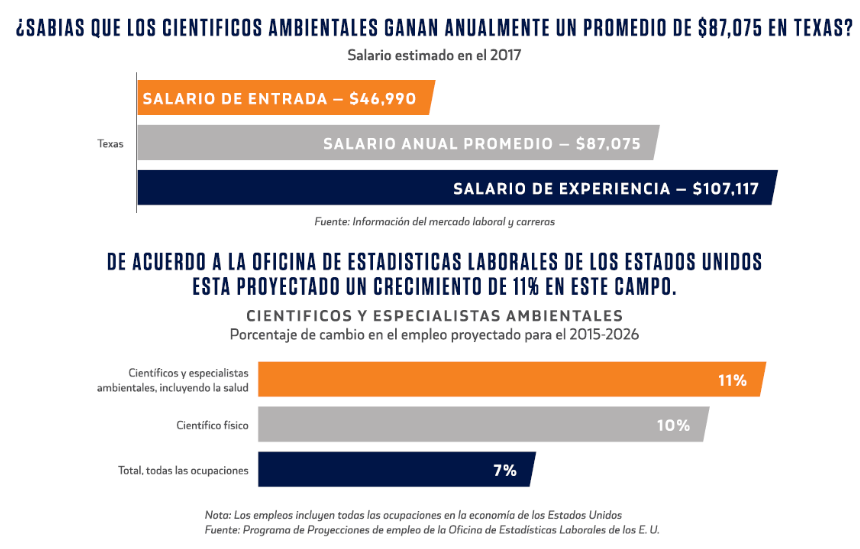Why study Earth, Environmental and Resource Sciences?
There are many career opportunities in the geosciences. The oil industry employs many geologists and geophysicists to explore and produce oil and natural gas. Geoscientists work in the environmental industry to clean up hazardous chemical spills, protect wetlands and groundwater, design waste facilities and in many other tasks. The US government employs a growing number of geologists in jobs that range from determining where a landslide might occur, to determine where roads should be built, to using satellite imagery to show how a city is growing, to working Mars exploration through NASA. Geologists also complete research in government laboratories and agencies such as Los Alamos National Laboratory and the U.S. Geological Survey. College and universities employ geologists and geophysicists to conduct research and teach as a lecturer or tenure-track professor. Many geologists teach earth science in middle and high school as well as community college.
• Unemployment: 0.96%
• Avg. salary: $79,851
• BA holders with a master's degree: 82.7%
• BA holders in labor force: 20,837
Geosciences majors, who study to enter careers in earth science, energy extraction, and natural preservation, are among the least likely to be unemployed and some of the best-paid college graduates. The average geosciences degree holder earns $79,851 a year – more than triple the average salary of college graduates. Geoscientists have great future job prospects as there will likely be continued demand for improvements in energy technology.
Environmental Scientists study changing climate, environmental damage, population growth, energy demands, and habitat loss that have become increasingly dominant in Americans’ minds over the past 50 years. As a result, demand for qualified environmental scientists to assess changing conditions and create positive solutions, has increased tremendously. UTEP Environmental Science students have found worth while careers with the Environmental Protection Agency, Texas Commission Environmental Quality, Texas Parks and Wildlife, National Park Service, Forest Service, United States Geological Survey, U.S. Army and a host of private companies. UTEP’s program gets students involved in real-world problems with internships and research opportunities. All students take the University core curriculum, then begin working within the Environmental Science core. Students choose a concentration area that focuses on Biology, Chemistry, Geoscience, Hydroscience or Environmental Science with a Secondary Education minor. UTEP’s ESCI undergraduates conduct research and present their findings at University colloquiums, regional and national conferences. The interdisciplinary ESCI Faculty conducts wide-ranging investigations.


Why study at UTEP?
UTEP originally was the Texas College of Mines and the Earth, Environmental and Resource Sciences Department has a long tradition of excellence. UTEP recently earned the Carnegie Research Distinction and is a Top Tier R1 university. Many of our graduates go into professional careers or graduate school. The department is also very active in research, and has received millions of dollars in research grants from many organizations, including the National Science Foundation, the United States Geological Survey, NASA, the Department of Energy, and major oil and gas corporations. This allows students to step beyond the classroom and have opportunity to perform research under the guidance of a faculty member. This year, UTEP geologists worked in the greater El Paso area, Canada, Mexico, the Alps, the Himalayas, and Africa.

My Summer Research Experience - by Angelo Trejo
I was accepted to participate in the Woods Hole Partnership in Education Program (PEP) as a 2019 summer intern. That summer I worked at the Marine Biological Laboratory in Woods Hole, MA, and gaining lots of experience in environmental research. One of the opportunities offered is the PEP research cruise. We boarded a research vessel, called the SSV Corwith Cramer, for five days to experience what it is like to be part of the crew. It was extremely hard, rewarding work!




